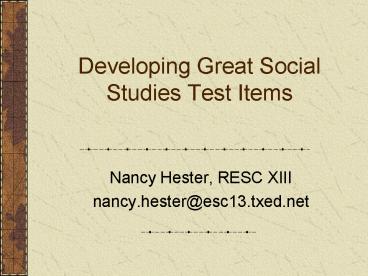Developing Great Social Studies Test Items - PowerPoint PPT Presentation
1 / 25
Title:
Developing Great Social Studies Test Items
Description:
You should attempt to write these types of items to ... Sequencing by Roman numeral. Who would have been helped by (law, invention, organization, reform) ... – PowerPoint PPT presentation
Number of Views:78
Avg rating:3.0/5.0
Title: Developing Great Social Studies Test Items
1
Developing Great Social Studies Test Items
- Nancy Hester, RESC XIII
- nancy.hester_at_esc13.txed.net
2
You should attempt to write these types of items
to include on every test
- Lower Level Easy (LLE)
- Lower Level Difficult (LLD)
- Higher Level Easy (HLE)
- Higher Level Difficult (HLD)
3
United States History - LLE
- The policy of acquiring colonies and building
empires is known as - A. Isolationism
- B. Industrialism
- C. Anti-colonialism
- D. Imperialism
4
United States History - LLD
- Which of the following would describe the foreign
policy of the U.S. immediately after the
Spanish-American War? - A. Imperialism
- B. Isolationism
- C. Militarism
- D. Socialism
5
United States History - HLE
- Which of the following actions by the U.S.
Government would have been endorsed by
imperialists? - A. Building the Panama Canal
- B. Granting independence to the Philippine
Islands - C. Passing low protective tariffs
- D. Reducing military forces
6
United States History - HLD
- Imperialism ________ Isolationism
________ - A. Spanish-American War Period 1920s
- B. Gilded Age WWI Period
- C. Spanish-American War WWI Period
- D. Gilded Age 1920s
7
Plan Your Test
- 70 Easy to Medium
- 30 Difficult
- 50 Lower-Level Content
- 50 Higher-Level Content
8
Test Specification Chart
9
Examples of Higher Level Stems
- Which is an example of..
- Who would most likely have written (asked, said)
followed by a quote - Analogies
- Fill in the missing part of this graphic
organizer - Sequencing by Roman numeral
- Who would have been helped by (law, invention,
organization, reform)
10
Test Item Development
- Direct word associations in the stem and
distracter - Indirect word associations in the stem and
distracter - True, but doesnt fit the time period or
specified geographic area - True, but not true in this case doesnt answer
this particular question - Am I teaching and assessing in my classroom at
the same level that is expected in the TEKS?
11
Distracters
- Never make a distracter a throw-away
- If you use ALL, none, or except, do not
capitalize, italicize or use bold face. - Make all distracters parallel (verb phrases,
nouns, proper nouns, etc.) - Do not let one distracter stick out farther than
others - Do not repeat the same verbiage at the beginning
of distracters. (They all had.They all had.)
12
Distracters
- Be sure if you are asking for a generalization
all of the distracters are, in fact,
generalizations and not simple inferences or main
ideas. This is true of all of the skills to be
tested. - Be sure there is not more than one plausible
answer. - Avoid Best Answer
13
Distracters
14
Distracters
15
Skills Prompts
- Cause/Effect
- Why did/would.?
- If you removed..?
- Infer/Conclude
- The manufacturers must have..
- Summarize
- Which best describes..?
16
Skills Prompts
- What do you see? What does it mean?
See
Mean
17
(No Transcript)
18
Skills Prompts
- Low-Level Map Skills
- Direction
- Key
- Location
- Identification of Physical Feature
- High-Level Map Skills
- Cause/Effect - Impact of above on lifestyle,
work, climate, war, commerce, culture
19
Skills Prompts
- High-Level Map Skills, contd.
- Develop general conclusions supported by details
from the map (You can tell by looking at this
map that it must be place because - Main Ideas/Summaries break maps into parts
Describe and infer about each part
20
(No Transcript)
21
Skills Prompts
- Graphs, Charts and Data
- Simple to complex
- Comparisons (more, less, most, least)
- Conclusions/Generalizations (based on the data,
you can tell that) - Predict from trends (line graphs)
- Main Idea/Inference What do you think this
graph is about?
22
Skill Prompts
- Graphs, Charts, and Data, continued.
- Make justified decisions based on data (I would
prefer to open a business in place because.) - Connect cause/effect to trends or phenomena shown
- Transfer information from one form to another
(chart to graph)
23
(No Transcript)
24
Study Item Types
- Study samples of items to get ideas. Include
- Prompts
- Graphic Organizers
- Readings
- Direct Content Questions
- Do not try to use one type of item over and over.
Vary the stems.
25
Sources
- Jan Moberly, Director of Curriculum and
Instruction, Region 10 ESC - Kosovo War Crimes http//edweb.sdsu.edu/webquest
.html - National Archives and Records Administration
http//www.nara.gov - Library of Congress American Memories
http//www.loc.gov/ammem - Texas A M University Department of Education
Empowerment Zone http//empowermentzone.tamu.edu
/MA/viewinfo.html?id16































